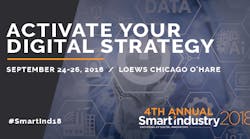Leveraging digital tools to advance lean initiatives
In September at the fourth-annual Smart Industry Conference, Peggy Gulick will present a keynote titled
“AGCO Leverages Digital Tools to Advance Lean Initiatives.” Today the director of digital transformation—global manufacturing with AGCO previews her presentation, celebrates the value in virtual reality and explains what she means by developing a “communications culture.” Take a look…
Smart Industry: How do modern, digital tools prompt a leaner approach to your business?
Peggy: The ability to digitalize an organization’s value stream offers competitive advantage and increased customer value. AGCO’s continuous-improvement efforts focus on lean enterprise adoption as a critical component to an innovation culture. Our adopted lean philosophy drives core understanding of business processes and value streams, allowing us to identify and successfully integrate digital tools with recordable and sustained results. Companies that consistently rely on their lean principles will successfully overcome the barriers and achieve their digital potential. Embedding digital enablers in lean cultures, including robotics, AR/VR, IoT, factory visualization and shop-floor integrated feedback loops, will advance the organization’s ability to drive value to the customer.
Smart Industry: What is "communications culture" and how does it enable you to better exploit benefits of digital transformation?
Peggy: Communication is key to engaging employees and inspiring their best work and organizational success. A successful communications culture balances ‘imparting’ information and ’inviting’ it. Although leaders at AGCO establish organizational roadmaps for action and align employees with business goals, the employees need a way to communicate information that affects their work lives and ability to be successful. These channels are even more important to an innovative culture. Directional shifts toward innovation require well-communicated decisions, actions and plans to the entire organization in order to engage employees’ passion and commitment.
Peggy: Our product-design team finds great value in virtual reality glasses. Not only do they broaden the ability for a team to ‘see’ what others are thinking, but they allow design teams to remotely interact, all in virtual glass. Everyone sees the same product and projected-design strategies.
As a problem-solving organization and culture, we have weighed the value of wearable smart glasses in many areas, including welding, paint preparation, assembly, quality, technical services, material management and even plant tours. The first thing that we have discovered is that the projected value of replacing current tools, whether it be paper work orders or terminal work instructions, with smart glasses consistently exceeds our initial business case.
All pilots that we have conducted has been in response to a defined problem with comprehensive problem-solving actions and metrics associated. Substantiating that smart glasses are a lean tool, and not an industry requirement or cool factor, we have reported 30% reduction in processing times, 50% reduction in amount of time employees train on the job (new hire and cross-functional) and noted reduction in quality and safety incidents. New product launches, multi-operation and new-hire training are easily administered and audited for success. The greatest value for the glasses has been in assembly and quality, both needing easy and quick access to hands-free instructions, noting AGCO as a manufacturer of complexly configured products.
Smart Industry: What unique challenges/opportunities are there with digital transformation in the agricultural-equipment space?
Peggy: Digital advancements give farmers the ability to gather information about equipment, crops, soil, water and livestock to guide business decisions. Unfortunately, many farms are in rural and regional areas and face infrastructure constraints, poor network and/or electrical connectivity. As an agricultural-equipment manufacturer, we share these pains with our customers and continue to partner to address them.
Smart Industry: What most excites you about the near future of your digital transformation?
Peggy: Although it is rewarding working in a plant that is taking full advantage of the value created by digital solutions, including Glass, cobots, AGVs, 3D printing, AR/VR, sensors, cloud, eksoskeletons and more, the most exciting change for me is the employees’ increased ability to act on our customers' demands with agility and transparency. When employees have easy access to information and are encouraged to take advantage of creativity and quick innovations, the culture benefits. When the focal point of every decision is our customer experience, our customer benefits. The most lasting impressions of change you will embrace when you walk through our plants will be our culture and our people.
Innovation is all about trying new things and taking risks. In the end, the greatest risk of all is not taking any.



